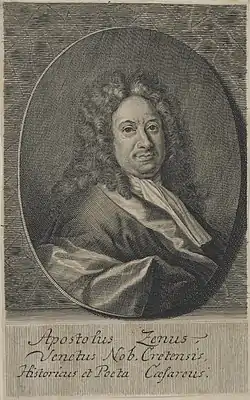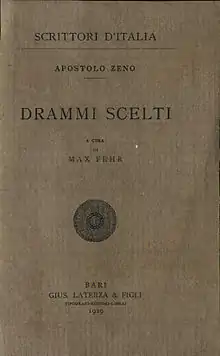Apostolo Zeno
Apostolo Zeno (11 December 1669 in Venice[1] – 11 November 1750 in Venice) was a Venetian poet, librettist, journalist, and man of letters.

Early life
Apostolo Zeno was born in Venice to a colonial branch of the Zeno family, an ancient Venetian patrician family.[2] His family had been transplanted from Venice to the Kingdom of Candia in the 13th century in order to maintain Venetian order and suppress any rebellious subjects.[3][4][5] Following the assault on the island by the Ottoman Empire, the remaining members of his family returned to Venice.[6] Upon return they were not readmitted to the patrician class, but were only able to obtain status as ordinary citizens.[7] His father was Pietro Zeno,[8] a doctor of medicine, and his mother, Caterina Sevasto, belonged to an illustrious and powerful family from Candia, Crete.[9]
Having lost his father at an early age, he was left to the care of his mother, who remarried to Venetian senator Pier Antonio Cornaro. His education was entrusted to the Somaschi Fathers.[10]
He was in 1691 among the founders of the Accademia degli Animosi. In 1695, he composed his first libretto, Gli inganni felici, which obtained great success, making him a fashionable librettist. From 1705, he worked with Pietro Pariati, keeping the theatrical scenes for himself and leaving to Pariati the composition of the libretti.
Works

He began work as a literary journalist for the Galleria di Minerva, also taking upon executive responsibilities, but distanced himself when he realized that he had not succeeded in making the impact upon the publication that he intended. In the end he described it as an idiocy.
In 1710 together with Scipione Maffei, Antonio Vallisneri and his brother, Pier Caterino Zeno, he founded the Giornale de' letterati d'Italia, maintaining that it was necessary that "Italians themselves make their own newspaper... revealing that good sense, erudition and ingenuity never were lacking among us, and now more than ever are they flourishing."
The tri-monthly publication had prestigious contributors such as Scipione Maffei, Antonio Vallisneri, Eustachio Manfredi, Ludovico Antonio Muratori, Giovanni Battista Morgagni, Giovan Battista Vico, Bernardino Ramazzini. Motivated above all by the desire to improve Italian learning, it enjoyed considerable success.
When Apostolo Zeno was called to duty as poet laureate to the imperial court of Vienna in 1718, his brother, Pier Caterino took over the direction until 1732, publishing the periodical annually. Apostolo remained in Vienna until 1729, at which point he was replaced by Pietro Metastasio. He returned to Venice, dedicating himself to works of erudition and to coin-collecting.
Zeno wrote the libretti for 36 operas with historical and mythological themes, including Gli inganni felici (1695), Odoardo (1695) Faramondo (1698), Lucio Vero, Imperatore di Roma (1700), Griselda (1701), Temistocle (1701), Merope (1711, Edition, 1727), L'Ambleto (1712), Alessandro Severo (1716), T'Euzzone (1719), Ormisda (1721), Artaserse (1724), Semiramide (1725), Domenico Sarro's Il Valdemaro (1726), Astarto (1730), Caio Fabbricio (1733), Euristeo (published 1757), and Sesostri re d'Egitto (Prague edition 1760) as well as 17 oratorios, including Giuseppe (1722), Gioaz (1726), David umiliato (1731). Among his literary works, the Dissertazioni vossiane are additions and corrections to De historicis latinis by Voss. His Annotazioni to the Biblioteca della eloquenza italiana by Giusto Fontanini were published posthumously. His correspondence (Epistolario) is ample.
Critical evaluation
From condemnation of the unrealistic and exaggerated elements of melodrama was born a demand for greater verisimilitude in plots and for literary dignity in texts. Zeno was the first to undertake reform to make melodrama more sober, according to the arcadici principles, developed further by Metastasio. Inspired by French tragedians, he respected, as they did, the rule of the unity of time and space. He reduced the number of characters and scenes and eliminated the clown roles, constructing his works so that they could be presented also without music.
Francesco de Sanctis, referring to Metastasio, wrote that "if we look at the structure, his drama is constructed in the fashion which Apostolo Zeno already demonstrated. But the structure is only a simple skeleton. Metastasio breathed into that skeleton the grace and the romance of a happy and harmonious life. He was the poet of melodrama; Zeno was the architect."
References
- Phillimore, Catherine Mary (1891). Studies in Italian Literature, Classical and Modern. S. Low, Marston, Searle & Rivington. p. 162. OCLC 11170706.
Apostolo Zeno was born in Venice in 1669, His father, Pietro Zeno, was a doctor of medicine ; his brother, Catarina, belonged to the family of the Sevasti.
- Nicolò, Bettoni (1822). Vite e ritratti di uomini celebri di tutti i tempi e di tutte le nazioni - Volume X. Milano: Per Nicolò Bettoni.
Nella colonia delle famiglie patrizie, che la repubblica Veneta trapianti nel regno di Candia a fine di ritenere più, agevolmente a freno que' sudditi rivoltosi, fu compreso anche il ramo dell'illustre famiglia da cui discese il nostro Apostolo.
- Nicolò, Bettoni (1822). Vite e ritratti di uomini celebri di tutti i tempi e di tutte le nazioni - Volume X. Milano: Per Nicolò Bettoni.
Nella colonia delle famiglie patrizie, che la repubblica Veneta trapianti nel regno di Candia a fine di ritenere più, agevolmente a freno que' sudditi rivoltosi, fu compreso anche il ramo dell'illustre famiglia da cui discese il nostro Apostolo.
- Scienza, filosofia e religione tra '600 e '700 in Italia. F. Angeli. 1990. p. 119. ISBN 8820465353.
...Nicolò, primogenito di Pietro e Caterina Sevasto, nacque a Venezia, il 27 luglio 1666, da un ramo della nobile famiglia veneziana degli Zeno, che si era trasferito a Candia e che, in seguito, aveva perso la prerogativa dell'inclusione nel libro d'oro dell'aristocrazia veneta.
- Brydges, Samuel Egerton (1821). Res literariæ. Rome: Francesco Bourlié. p. 107.
- Nicolò, Bettoni (1822). Vite e ritratti di uomini celebri di tutti i tempi e di tutte le nazioni - Volume X. Milano: Per Nicolò Bettoni.
Dopo la irruzione dell'armi ottomane in quell'isola si restituì la rimasta prosapia Zeno all'antica sua patria, non riammessa però all'ordin patrizio, ma solo alla veneta cittadinanza.
- Nicolò, Bettoni (1822). Vite e ritratti di uomini celebri di tutti i tempi e di tutte le nazioni - Volume X. Milano: Per Nicolò Bettoni.
Dopo la irruzione dell'armi ottomane in quell'isola si restituì la rimasta prosapia Zeno all'antica sua patria, non riammessa però all'ordin patrizio, ma solo alla veneta cittadinanza.
- Nicolò, Bettoni (1822). Vite e ritratti di uomini celebri di tutti i tempi e di tutte le nazioni - Volume X. Milano: Per Nicolò Bettoni.
Da Pietro Zeno, ch'esercitava in Venezia la medicina, nacque Apostolo l'anno 1669.
- Storia letteraria d'Italia - Volume III. 1752. p. 396.
...Caterina d'Apostolo Sevasto (cioè a dire d'una delle Famiglie di Candia, che ne varcati secoli fossero ivi in grande stato e di nobiltà, e di possanza).
- Nicolò, Bettoni (1822). Vite e ritratti di uomini celebri di tutti i tempi e di tutte le nazioni - Volume X. Milano: Per Nicolò Bettoni.
Perdette egli il genitore nella sua tenera età... Prese ella singolar cura della educazione del N. Apostolo, che affidò a P.P. Somaschi...